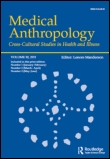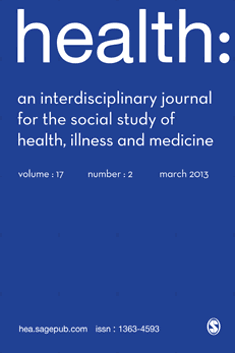
Medical Anthropology
Scope & Guideline
Unveiling Health Through an Anthropological Lens
Introduction
Aims and Scopes
- Cultural Influences on Health:
The journal explores how cultural beliefs, practices, and social structures shape health behaviors, access to care, and perceptions of illness across different populations. - Ethnographic Research Methodologies:
Medical Anthropology emphasizes qualitative research methods, particularly ethnography, to gain deep insights into the experiences and perspectives of individuals and communities regarding health and illness. - Global Health Perspectives:
The journal addresses global health issues, focusing on the impacts of globalization, migration, and social inequalities on health outcomes and healthcare systems. - Interdisciplinary Approaches:
Medical Anthropology incorporates perspectives from various disciplines, including sociology, psychology, and public health, to provide a comprehensive understanding of health-related phenomena. - Critical Examination of Healthcare Systems:
The journal critically analyzes healthcare practices, policies, and the implications of biomedical interventions, particularly in marginalized communities.
Trending and Emerging
- Impact of Technology on Health:
There is a growing focus on how digital health technologies, such as telemedicine and wearable devices, influence patient care and health management, particularly in chronic illness contexts. - Mental Health and Well-Being:
Research on mental health, particularly in relation to social stigma, access to care, and community support mechanisms, is increasingly prominent, highlighting the importance of mental health in overall well-being. - Health Inequities and Social Justice:
There is an emerging emphasis on addressing health disparities related to race, gender, and socioeconomic status, with a focus on advocacy and policy implications for marginalized groups. - Climate Change and Health:
Recent publications are beginning to explore the intersections between environmental changes and health outcomes, addressing how climate-related issues affect vulnerable populations. - Reproductive Justice and Governance:
The journal is witnessing an increased interest in reproductive rights, particularly in the contexts of policy, cultural practices, and the experiences of marginalized women.
Declining or Waning
- Traditional Medical Practices:
Research focused on traditional medicine and herbal remedies has become less frequent, possibly overshadowed by the growing emphasis on biomedicine and technology in healthcare. - Static Historical Analyses:
There appears to be a waning interest in purely historical perspectives on health without contemporary relevance, as current health crises and lived experiences take precedence. - Overemphasis on Individualism:
Themes that center solely on individual health narratives without contextualizing them within broader social and cultural frameworks are less prominent, reflecting a shift towards more systemic analyses.
Similar Journals

SOCIAL HISTORY OF MEDICINE
Illuminating the Past to Shape Future Health NarrativesSOCIAL HISTORY OF MEDICINE, published by Oxford University Press, is a premier journal dedicated to advancing the field of medical history through a social lens. With a rich history since its inception in 1988, the journal spans key developments and explorations up to the present, emphasizing the intricate relationships between social structures and medical practices. Holding a Q1 ranking in History and a Q3 ranking in Medicine (miscellaneous), it attests to its influential position within both disciplines, facilitating a comprehensive understanding of how societal factors shape health and medicine. Researchers, professionals, and students alike benefit from its rigorous peer-reviewed articles that encourage interdisciplinary dialogue and foster new insights. The journal is indexed in Scopus, currently ranked 132nd out of 1760 in Arts and Humanities—History, placing it in the 92nd percentile, and 232nd out of 398 in Medicine, with a 41st percentile ranking. Although not open access, the content is invaluable for anyone interested in the historical intersections of medicine, making it an essential resource for scholarly inquiry.

Anthropology & Medicine
Bridging Cultures and Care.Anthropology & Medicine, published by Routledge Journals, Taylor & Francis Ltd, represents a vital intersection of social sciences and health research, providing a platform for innovative scholarship in the field of anthropology and its implications for medicine. With an esteemed 2023 Scopus ranking placing it in the top tiers of anthropology and arts and humanities, this journal fosters critical dialogue between anthropological insights and medical practice, addressing pressing health issues through ethnographic lenses. The journal’s scope includes the exploration of cultural practices, health inequalities, and the social determinants of health, making it essential reading for researchers, professionals, and students dedicated to understanding the complexities of human health in diverse contexts. Although not an open access publication, its rigorous academic standards and impactful research contributions underscore its importance within both anthropology and medical fields, as reflected in its impressive category quartiles and its convergence from 1997 to 2024. Engaging with this journal positions scholars at the forefront of discussions shaping the future of healthcare and anthropology.

FAMILY MEDICINE
Elevating Standards in Family Medicine ResearchFAMILY MEDICINE is a prestigious peer-reviewed journal published by the SOC TEACHERS FAMILY MEDICINE, dedicated to advancing the field of family practice. With an ISSN of 0742-3225 and an E-ISSN of 1938-3800, this journal serves as a vital resource for researchers, healthcare professionals, and students involved in family medicine. Founded in 1985, it has consistently contributed to the growth of knowledge in this critical area, showcasing a wide range of original research, reviews, and practical applications. Recognized for its impact, the journal holds a Q2 quartile ranking in Family Practice, placing it in the top tier within its category, and ranks 22nd out of 56 in the Scopus database, reflecting its influence and relevance. While the journal operates under a subscription model, it remains committed to providing high-quality discourse and insights that shape the practice of family medicine. With a focus on current issues and evidence-based practices, FAMILY MEDICINE continues to be an essential publication for those dedicated to improving patient outcomes and advancing the field.

ANTHROPOLOGICAL QUARTERLY
Bridging Theory and Practice in Ethnographic ResearchANTHROPOLOGICAL QUARTERLY, published by the George Washington University Institute of Ethnographic Research, stands as a vital resource in the field of anthropology and broader arts and humanities studies. With an ISSN of 0003-5491 and an E-ISSN of 1534-1518, this esteemed journal has been contributing to academic discourse since its establishment in 1981. The journal holds a respected position in both the Q2 category for Anthropology and the Q2 category for Arts and Humanities (miscellaneous), demonstrating its impact and relevance, as evidenced by its rank of #152 out of 502 in the Social Sciences sector for anthropology and rank of #179 out of 552 in the Arts and Humanities field. Researchers, professionals, and students can rely on ANTHROPOLOGICAL QUARTERLY for rigorous peer-reviewed articles that push the boundaries of ethnographic research and anthropological theory, addressing contemporary issues with scholarly precision. The journal’s commitment to fostering critical analysis and interdisciplinary perspectives establishes it as an essential platform for advancing knowledge within its diverse and dynamic field.

JOURNAL OF THE HISTORY OF MEDICINE AND ALLIED SCIENCES
Fostering Scholarly Dialogue on Medicine's LegacyJOURNAL OF THE HISTORY OF MEDICINE AND ALLIED SCIENCES is a prestigious academic journal published by Oxford University Press, focusing on the interdisciplinary study of the historical evolution of medicine and its related fields. Since its inception in 1946, this journal has been at the forefront of disseminating scholarly research that bridges history and contemporary medical practices. With an impressive Q1 ranking in History and a dedicated readership comprised of researchers, professionals, and students, it serves as a vital resource to enhance understanding of the historical contexts that shape modern healthcare. Although categorized in Q4 in Geriatrics and Gerontology, the journal's contributions are invaluable for fostering discussions on the development and implications of medical practices over time. The journal does not offer Open Access options, maintaining a traditional subscription model to support high-quality peer-reviewed research. Its commitment to advancing the field is reflected in its prominent position within the Scopus rankings, making it an essential platform for those engaged in the intersection of history and medicine.

Journal of Bioethical Inquiry
Championing Ethical Inquiry in Health PolicyThe Journal of Bioethical Inquiry, published by Springer, is a prominent academic journal in the fields of bioethics, health policy, and social sciences. Established in 2004 and running through 2024, it is recognized for providing a critical platform for the exploration of ethical issues arising in the contexts of healthcare and policy making. With an ISSN of 1176-7529 and an E-ISSN of 1872-4353, this esteemed journal holds a Q2 quartile ranking in both Health Policy and Health (Social Science) categories, indicating its significant impact and contributions to the field. It boasts impressive Scopus rankings, with a standing of #70 out of 371 in Social Sciences _ Health (Social Science) and #68 out of 310 in Medicine _ Health Policy, representing its relevance and authority in these domains. Although it does not currently offer open access options, the Journal of Bioethical Inquiry remains a vital resource for researchers, practitioners, and students eager to engage with the complexities of bioethical challenges and to advance the discourse on health policies.

Global Qualitative Nursing Research
Championing open access to vital nursing research.Global Qualitative Nursing Research, published by SAGE Publications Inc, is a premier open-access journal dedicated to advancing the field of qualitative research within nursing. Since its inception in 2014, this journal has championed the dissemination of innovative and impactful findings that enhance the understanding and practice of qualitative methodologies in nursing and healthcare contexts. With an impressive Scopus ranking of #43 out of 139 in General Nursing, placing it in the 69th percentile, and achieving a Q2 quartile ranking in 2023, it stands as a vital resource for researchers, practitioners, and students alike. The journal embraces a wide array of qualitative approaches, fostering a diverse academic dialogue that influences nursing practice, education, and policy on a global scale. As an open-access publication, it ensures that critical research is widely accessible, facilitating knowledge transfer and supporting evidence-based practices in nursing across the globe. Addressing crucial themes in nursing and qualitative research, Global Qualitative Nursing Research is positioned as an indispensable platform for the scholarly community, driving both inquiry and innovation in the nursing discipline.

MAYO CLINIC PROCEEDINGS
Transforming Clinical Practice with Premier Medical FindingsMayo Clinic Proceedings is a premier peer-reviewed medical journal published by Elsevier Science Inc, dedicated to advancing clinical practice through high-quality research, reviews, and case reports since its inception in 1945. With an impressive impact factor and recognized as a Q1 journal in the Medicine (miscellaneous) category, it ranks as #21 out of 636 in the realm of General Medicine, placing it in the top 96th percentile among its peers. The journal serves as a vital resource for healthcare professionals, researchers, and students by promoting evidence-based medicine that addresses contemporary challenges in clinical practice. Although it does not currently offer open access options, its rigorous publication standards ensure that its findings are credible and relevant, making it an essential platform for disseminating significant medical advancements. With a commitment to progress in healthcare, the Mayo Clinic Proceedings continues to shape the future of medicine for audiences across the globe.

Acta Medico-Historica Adriatica
Exploring the Intersection of Medicine and HistoryActa Medico-Historica Adriatica is a pivotal open-access journal dedicated to the interdisciplinary study of medical history and health culture, published by the Croatian Scientific Society for the History of Health Culture. Since its inception in 2003, the journal has served as a platform for scholars and researchers spanning various fields, including medicine, history, and cultural studies, to disseminate their findings and insights. Situated in Croatia, this journal has established a commendable profile, evidenced by its Q4 ranking in the Medicine (miscellaneous) category, as well as its position in the 22nd percentile among general medicine journals in Scopus ranking. The journal focuses on the convergence of contemporary medical practices with historical perspectives, facilitating a deeper understanding of how past events shape present health paradigms. With an annual publication schedule that continues through 2024, Acta Medico-Historica Adriatica is an essential resource for professionals, students, and researchers seeking to explore the rich tapestry of health history and culture in an accessible format.

HEALTH
Empowering scholars to drive impactful health research.HEALTH is a leading journal published by SAGE Publications Ltd, focusing on the dynamic field of health as a social science. Since its inception, the journal has made significant contributions to the understanding of health-related issues through interdisciplinary research and rigorous analysis. With an impressive 2023 quartile ranking of Q1 in Health (Social Science) and a Scopus rank of #73 out of 371 in its category, HEALTH stands out for its commitment to advancing academic discourse and promoting impactful findings in the field. The journal's publication history spans from 1946 to 2024, consistently offering a platform for groundbreaking studies that influence both policy and practice. Although currently not an open access journal, HEALTH provides vital insights that are essential for researchers, professionals, and students focused on the intersection of health, society, and public policy. For those engaged in health research, HEALTH represents a critical resource for contemporary and emerging issues, making it indispensable for advancing knowledge and fostering dialogue among scholars and practitioners alike.